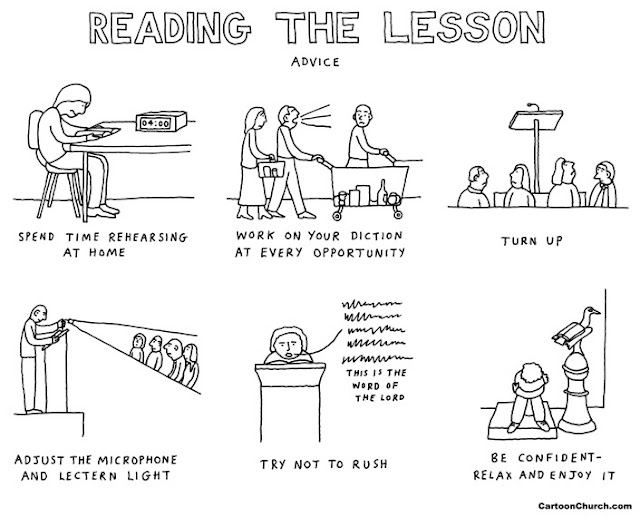Who reads in your church?
As a priest who regularly provides cover in a range of churches round our diocese, I often find myself asking people: “How do you do it here?” The almost inevitable answer is a variation on “Just the normal way.” The problem is there are almost as many normal ways as there are churches. One of those points where there is considerable variation is the question of who reads which reading.
 |
| As always, perceptive humour from the excellent Dave Walker at CartoonChurch. The image is © Dave Walker and Cartoon Church and is used by kind permission of the artist. |
These differences are mainly focussed on the reading of the Gospel, where Roman Catholic, Anglican and other Protestant traditions differ. Before I get to the differences, I start with what they should all have in common, but all too often don’t. The chief commonality should be that those who read do so clearly, audibly, and in a way which allows the listener to grasp the meaning of the reading. People complain fairly quickly when the cantor for the psalm sings out of tune, but seem more ready to shrug when they can neither hear nor understand the reading.
We need to foster a culture of expectancy about listening to the readings, and not see them as a routine to be got through. The first step in creating expectancy that God will speak as we listen to the readings is to begin with the expectancy that we will hear them read well and with meaning.
In all churches, lay people read both Old Testament and Epistle readings. In Protestant churches, lay people typically read any of three readings (though at least in the UK, all three readings rarely seem to be used). In Roman Catholic Churches, the reading of the Gospel is a traditional role for a deacon, and where one is present, they read it. If there is no deacon, it is read by a priest. Lay people read the first two readings, and a lay cantor usually sings the psalm.
(It is always best if a way can be found of singing the psalm, but it is normal to read it at low masses. When it is read, rather than sung, it is commonly read by the same reader who reads the Old Testament reading.)
Anglican churches are entirely inconsistent: some mirror the Roman
Catholic practice, others the Protestant. In a great many, the Gospel is
read by the preacher, whether that person is ordained, or is a licensed
lay minister. In the face of such diverse practice, I shall simply
reiterate my plea for it to be read well, which in my experience, sadly,
is not always guaranteed by asking a priest or deacon to read it.




Comments
Post a Comment